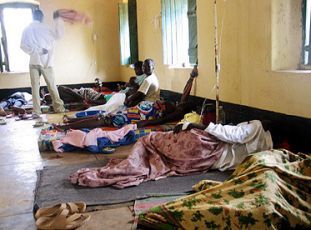Deadly cholera outbreak hits Northern Bahr el Ghazal
By Ngor Arol Garang
May 15, 2010 (WUNROK) — Peth Lou, one of the local administrative units situated east of Wanyjok, headquarters of Aweil East County, Northern Bahr el Ghazal State, is again on the verge of a severe cholera outbreak.

The outbreak is entering its second week and shows little sign of slowing down. It has quickly spread into surrounding villages of Mabil, Dhok, Rumrit, and Baai chok, Wunyiik, Maluil, Majak, Warkou, Halkou and Riangkou, Marial Ngap, killing 2 people and infecting the entire village.
The village, located 20 miles from the main Aweil Civil Hospital, is home to over ten thousand residents. Health authorities say the disease first struck towards the end of April last year, killing three people at a go before its confirmation by the local ministry of health.
It is believed another 21 villages surrounding Ameth Lou, east of Malual Baai Payam, have also registered cholera cases in the last one week with records showing that 12 suspected patients were admitted at Malual health center before being discharged Tuesday.
Some of the villages that are worst hit in Ameth include; Wunyor, Warapac, Mayom, Akong, Akuac and Majak Paluiel. Mathiangdit and Areng have also been reported to have the highest number of infections.
Garang Baak Chol, a resident of Ameth village who came to Aweil town seeking medical intervention from heath authorities, attributes the outbreak to lack of clean water for human consumption.
“Our two boreholes in Ameth drilled by IRC (referring to an International Rescue Committee which is running number of health units in the area) broke down a year ago. Since then, we have never had clean water,” he said. “We resumed drinking from unprotected hand dug wells. Water from these wells is unsafe and is the source of diarrhea, I experienced it myself,” he said.
Garang who said trained by IRC as a village health volunteer adds that cholera could also be due to people defecating in the dry shallow water source bed since most of them lack pit-latrines. “When it rains, the water carries the waste to the sources situated on most drinking sources as it roams through the villages,” he said.
Akot Majok Aguek, a certificated community health worker in the area equally caught up with Sudan Tribune from Aweil town and said that outbreak is due to lack of safe areas of waste disposal. Many villages do not have pit-latrines around their settlements
Spread by water contaminated with human excrement, cholera is a result of not having safe water to drink and sanitation systems to dispose of waste away from the water sources, he explained adding that government has just learned this outbreak and is mobilizing international organizations for quick intervention.
“We have just received information of increased cases of watery diarrhea from Aweil East County health authorities in the two villages of Peth and Ameth with surroundings,” Akot said. “We are mobilizing response to this worrying situation, but we continue to face numerous challenges,” he further said.
There is shortage of cholera kits and other essential medical supplies particularly oral dehydration salts, antibiotics and gloves.
Aweil hospital is empty. It has nothing for emergency inside itself let alone outreach supplies.
“This is why we have resorted to mobilizing international organizations working in the field of health such as IRC, MSF-France, Tear fund and other community based health organizations,” he said.
He adds that cholera could spread quickly due to the regular movement of a highly nomadic population and unprotected water sources which are in the interior and inaccessible. “Cholera may spread to the other surrounding villages if authorities do not take preventative steps to sensitize residents,” he warned.
Majok also cites inadequate beds and supplies for patients and limited skilled human resource as some of the hurdles the hospital is facing in the fight against the epidemic.
He says interventions remain localized in town. There is need for preparedness in the peripheral health units to avert possible negative outcome from emergency, he said appealing to the Government for more funding in order to fight the outbreak.
In an email to Sudan Tribune to Sudan from Aweil town, Santino Mayen, a clinical officer in the state government explained the cause as an infection in the intestines and can kill in hours.
He said signs and symptoms of cholera victims include severe diarrhea which manifests in as little as two hours or up to five days after infection. This can lead to extreme dehydration and kidney failure.
About 80% of the people infected with the cholera bacterium never develop symptoms. However, the bacterium stays in their faecal matter for seven to 14 days, leaving others at risk of infection. Of those who develop symptoms, 80% are mild to moderate while between 10% and 20% develop diarrhea.
If left untreated, about 50% of cholera cases can be fatal, he explained. Prevention and treatment of most cases (80%) can be treated through oral dehydration salts. These salts reverse dehydration and restore potassium levels following the onset of acute diarrhea.
The most severe cases, in which the patient is extremely dehydrated, can be treated through intravenous fluids and antibiotics, he adds He continued to say provision of safe water and sanitation services, community outreach and awareness campaigns that stress the importance of personal hygiene, especially hand-washing, are essential in curbing cholera.
Always focus on the underlying causes of water and sanitation-related deaths, like water availability, water quality, waste management and community hygiene education, to best protect at-risk populations from cholera and similar illnesses, he explained.
(ST)

Mr Famous Big_Logic_Boy
Deadly cholera outbreak hits Northern Bahr el Ghazal
This is the lifestyle the people of South Sudan deserve to live, shame on greedy and selfish of GOSS toward the people of South. Southerns has never and will never enjoy peace and better lifestyle under the management of Hyenas.